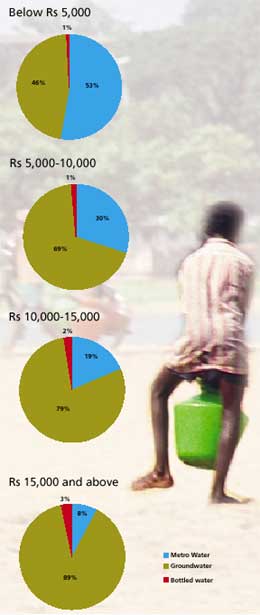All bottled up
 The perpetual water shortage in Chennai prompted the Centre for Science and Environment (cse) to study the different facets of the problem. A Vaidyanathan, eminent irrigation economist, and water researcher J Saravanan conceptualised and supervised the survey, which was carried out by students of the Madras Christian College. The survey covered over 1,510 households throughout the metropolis and collected data on water use. The 155 wards of the city were divided into three broad categories according to the water availability based on the assessment by Metro Water officials. Each of the three categories were sub-divided into upper, middle and low income groups; nine in all. A random sampling procedure was used to identify the households to be included in the survey, conducted from December 2003 to January 2004.
The perpetual water shortage in Chennai prompted the Centre for Science and Environment (cse) to study the different facets of the problem. A Vaidyanathan, eminent irrigation economist, and water researcher J Saravanan conceptualised and supervised the survey, which was carried out by students of the Madras Christian College. The survey covered over 1,510 households throughout the metropolis and collected data on water use. The 155 wards of the city were divided into three broad categories according to the water availability based on the assessment by Metro Water officials. Each of the three categories were sub-divided into upper, middle and low income groups; nine in all. A random sampling procedure was used to identify the households to be included in the survey, conducted from December 2003 to January 2004.
The number of sample households selected in each of the nine groups was in proportion to the total number of households in the respective groups (obtained from the census). Households for the survey were selected from randomly identified streets within each sample ward. Ten households from each selected street should be surveyed. Thus, 1,510 sample households were identified from 151 streets in 31 wards spread over the city. The survey was designed to elicit details of sources of water, water use pattern, storage tanks and sumps, the characteristics of dugwells/borewells, and implementation of rainwater harvesting.
Some years earlier, a large scale survey of water use in the city had been conducted by A M Murugappa Chettiar Research Centre. It showed the per capita water consumption (measured as litres per capita daily or lpcd) was considerably lower than the 135 lpcd taken as the norm for a metropolis and that public sources accounted for less than half of the total consumption. Though it was known that use of groundwater from private wells (including borewells) was rampant and the water table was plummeting, hard data was not available. The cse survey not only filled this gap, but found some striking facts:
• Contribution by Metro Water to the city's water requirement is dismal
Metro Water provides 79.8 million litres per day (mld), which is barely 34 per cent of the water requirement of 235.3 mld. The people have to make up for the deficit on their own: from dugwells/borewells; private tankers and bottled water.
To find out the total water consumption, the mean per capita consumption found through the survey was multiplied by the population for each of the nine groups and then their sum was calculated.
• The rich consume more water
About 42 per cent of the households surveyed had a monthly income of Rs 5,000 or less, 28 per cent were in the Rs 5,000 to Rs 10,000 range, 23 per cent in the Rs 10,000 to Rs 15,000 range and the remaining 7 per cent were in the income bracket above Rs 15,000.
• Dependence on groundwater increasing
Whereas earlier, individual houses had dugwells of 10 metre to 15 metre depth, the survey shows people are now opting for the deeper borewells (more than 30 metres).
This is an indication of falling water tables because of overexploitation of groundwater.
Based on the number of wells reported from the households surveyed, the average number of wells per household for each ward, and in turn for all the nine groups, was worked out.
cse survey estimates that there are 420,000 wells with a density of 2,400 wells per sq km in Chennai is spread. Of these, 393,000 are borewells while 27,000 are dugwells.
During the survey period, the water crisis was so severe that even the public system was totally dependent on groundwater extraction
Related Content
- Action taken report by District Magistrate Chamoli regarding Benital lake, Chamoli, Uttarakhand, 26/02/2024
- Judgment of the Kerala High Court regarding unauthorized hawkers/sellers of articles including plastic toys, plastic articles and drinking water in PET bottles in Sannidhanam, Pamba and Nilakkal, Sabarimala, Kerala, 08/01/2024
- Order of the Madras High Court regarding plea for regulating pilgrim footfall during temple festival of Adhi Karuvannarayar temple located in the Sathyamangalam Tiger Reserve, Erode district, Tamil Nadu, 02/01/2024
- Report by Karnataka State Pollution Control Board regarding waste management in Gokarna, Uttara Kannada district, Karnataka, 07/07/2023
- Thirty ninth report (Seventeenth Lok Sabha) on nano-fertilizers for sustainable crop production and maintaining soil health
- Stemming the tide: putting an end to plastic pellet pollution
